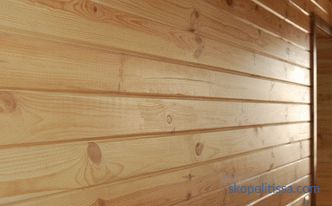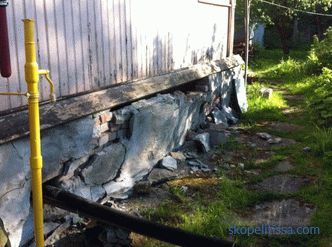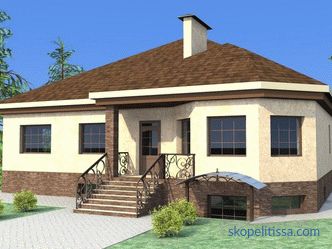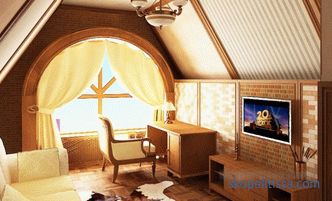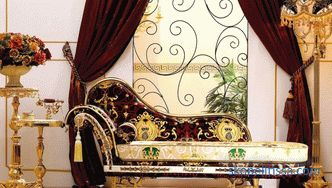This article contains information about the features of the four-slope roof. The topic will be useful for anyone who is going to perform roofing work, but has not yet chosen which construction to stop at. You will learn about the technology of installation and design, as well as building materials used for the construction of four-slope roofs - all that will help determine the choice of roof design and order construction work.
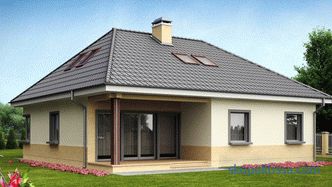
Project of a four-slope roof
This type The roof is characterized by the greatest resistance to any loads - increased reliability and durability. The erection of the truss system and the laying of the roofing pie does not require significant labor costs, which allows you to use less money when hiring specialists.
This design gives a large number of possibilities and variants of execution. There are many types of hipped roofs. The simplest system consists of two trapezoid and two triangular segments, the joints of which are closed by skates. It is important to note that the triangular slopes are usually from the side of the gables.
It is possible that all sections at once are in the shape of an isosceles triangle. All the edges at the same time converge at one point, which is located at the top of the structure. There are other ways to create 4 pitched roofs. For example, roofing with the use of multi-level or short slopes, combined with gables, as well as structures with sophisticated mansard windows and broken joints.
Note that building a roof system of this type of roof requires considerable experience in building. Therefore, it is better to hire specialists from a construction company if you are planning to erect a building with a roof that has four slopes.
What is a hip roof
It is worthwhile to dwell in more detail on the structure of the hip roof. This method implies that the corner rafters have a smaller angle of inclination than the frame. Bearing structures are made of 50 * 150 boards. Elements of the truss system, having a small length, are attached not to the ridge, but to the corner rafters at the same angle as the intermediate segments.
For the reliability of the joint, gash is produced, and metal corners or plates are superimposed on the seams. The ridge bar is usually cut from the same board with a cross section of 50 * 150. At its ends, central intermediate rafters dock in all directions. In this case, all elements of the structure are based on the lower end of the power plate.
The allowable angle of inclination for such a roof is from 5 to 60 degrees. The choice of this value depends on the planned features of the roof operation. The hip truss system has its advantages:
-
High resistance to atmospheric precipitation , gusts wind and mechanical damage .
-
The hip roof allows you to successfully use the attic .
-
This type of construction is compatible absolutely with all roofing .
Making adjustments to the project is also worth it if the roof is of an attic type, as gentle slopes leave too little usable space. The minimum angle of inclination should be 45 degrees. But the calculation of this parameter is affected by a large number of factors. One of them is the amount of precipitation in the area. At too high rates, the slope should be at least 30 degrees.
In the design of the four-slope roof, you need to add space for the installation of the chimney, water tanks and air vents. But before you begin to make a drawing, you need to calculate the truss system.
On our site you can familiarize yourself with the most popular 3184 house projects from the best construction companies with an impeccable reputation in the market. A wide choice, reasonable price from 51050 rubles, flexible conditions and quality guarantee allow you to choose the right option for any budget and realize all the wishes of the client. Directly to communicate with representatives, you can visit the exhibition of houses "Low-rise Country".
Materials for a four-slope roof
For any type of roof, a truss system is required, consisting of standard elements. The structure of the supporting structure includes power plates, tightening, rafters and support racks. Also, be sure to be ridged timber and crates. To build a roof of four slopes, usually used wood species such as pine, larch or spruce. Defects on lumber should not be, and the maximum permissible humidity is 22%.
For the production of rafters the board 50 * 150 is most often used, as mentioned above. The same board is used to create mauerlatov. But for the manufacture of supporting structures can also be used, and other sizes, such as 50 * 100 or 50 * 200. Specialists buy metal studs with thread as reinforcing screeds. It is also necessary to have boards for crates and plates for joining the elements together.
Before proceeding to installation, all wooden parts must be impregnated with antiseptics and fire retardants. This allows you to protect the roof from fungi and from fire.
For another 4 x pitched roofs, like any other, there must be a roofing pie consisting of vapor barrier and waterproofing, as well as a layer of insulation and sheathing. In order to give additional rigidity to the roof and to increase the area of the support of the finishing coating, a counter lattice is used.
Any materials are used as the roof covering. It can be slate or corrugated, shingle or tes, metal or cathepal and many other options. When choosing them you need to pay attention to quality, resistance to stress and decorative properties.
How to build a roof for a country house: a gable or chetyrezhskatnuyu and how to do it correctly? For advice, an objective opinion and recommendations of an expert, see in the video:
On our website you can find contacts of construction companies that offer construction audit services, roof repairs, reconstruction and rebuilding homes. Directly to communicate with representatives, you can visit the exhibition of houses "Low-rise Country".
Installation technology of a four-sloped roof
First of all, during the roofing works, power plates are laid. For wooden houses, this component is the last segment of the log house. Fasten it with the help of flashes. If the walls are made of brick, then the foundation of the entire roof is laid and fixed with mortar and metal pins.
In this case, in order for the fitting elements to coincide with the holes, the board is first laid on the surface of the wall with the pins, and then hit on it with a hammer. There will be marks on the tree, in the place of which it will be necessary to drill holes. The four-slope roof scheme assumes the presence of power plates along all the bearing walls.
Perpendicular to the floor beams, the support board is laid. As such an element is often used double board 50 * 200 with a gap in the middle. In order to achieve the desired distance, bars are inserted between the beams, and then the screws are screwed in or the nails are hammered. Its ends should extend about 15 centimeters beyond the boundaries of the mauerlat.
Next, three boards, previously cut to length, are mounted on the central beam, using a plumb line. The ridge board is fixed on the upper bases of the uprights. The truss roof system can be supplemented with laths of timber supporting the racks. This is necessary to improve the reliability and stability of the structure.
It may be interesting! In the article on the following link read about the calculation of the hip roof: design features and calculation on the calculator.
Next, proceed to the installation of central rafters. To do this, the board is applied to the upper end of the ridge, and cut from the bottom. Then, with the help of a pencil, the places of future cut-offs are marked, and in the mauerlate a groove is made for a third of the width of the rafter board, after which the rafter is fixed first to the ridge bar, and then inserted into this groove and fixed with metal plates. Intermediate rafters with a pre-selected step are installed in the same way.
The next step is the installation of corner rafters. It begins with the fact that two nails are driven into a corner at the junction of the power plates and into the corner of the ridge, after which the cord is pulled between them. Along this line and should pass angular rafters. It is also installed using the groove and lining.
To reinforce the roof, plankholes are fixed on the lower part of the rafters, which are boards tightening the opposite elements of the frame . Further, the entire roof is strengthened by puffs and braces, and places requiring increased strength are strengthened with additional fittings. This completes the arrangement of the frame of the four-slope roof. After all these operations are completed, they usually proceed to the laying of the roofing pie and the finishing coating. Then it remains only to establish a drainage system, seal the joints and hem the overhangs. On this work on the construction of the roof with four slopes end.
It may be interesting! In the article follow the link read about hip roof for gazebo: advantages, design, installation.
Conclusion
The four-roof roof is one of the most reliable structures used in the construction of both private houses and government institutions. This is justified by the increased strength and stability of such a roof. Calculation of a system consisting of four slopes is easy to perform, and such a scheme has several advantages over roofs of complex configurations, such as material savings, ease of installation, and proper drainage system.
